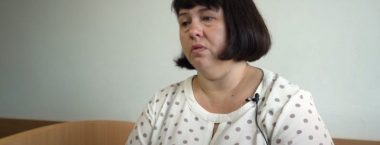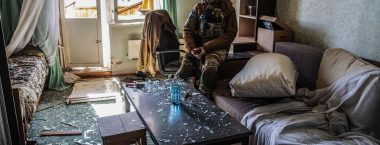
“People in their homes were dying from cold” – a nurse from Kharkiv
Interview by Taras Viychuk – I am 42 years old. I live and work in...
17 May 2022
22.01.2017
Tamara Martseniuk, a gender expert, continues to interview women who work in the field of Ukrainian advocacy. This time the interviewee of our permanent column “Women Human Rights Defenders, Who Change Ukraine” is the lawyer of the public reception of the Ukrainian Helsinki Union in Rivne Maria Tsypiashchuk.
Maria Tsypiashchuk is a lawyer and coordinator of the UHHRU public reception in Rivne. He teaches the course on human rights for political scientists and legal psychology, conducts practical sessions on international private and public law. Also, Maria is head of the legal clinic “Pro bono”. She is writing the Ph.D. thesis on psychological topics in legal sciences. She is a moderator of the cinema club of human rights documentary films DOCUDAYS UA in Rivne.
– Please share your history of involvement in the human rights movement in Ukraine. Why did you decide to work in this field?
– I think the story of my involvement began with my volunteer work at a legal clinic during the first year of my studies. Then it did not fit precisely in the understanding of the human rights movement. But now, knowing how the legal clinic functions, I understand that this segment is quite close.
In 2013, I passed the competitive selection at the school of the Kharkiv Human Rights Protection Group and came to Kharkiv to participate the one-week school in the field of human rights. It was a very good school with absolutely incredible people, among whom was Nastia Martynovska (she now works in the central office of UHHRU), Lesia Matusevych and others. And there I was impressed of what I heard and what I learned. Then I had met my current coordinator Lidiya Topolevska and began to work as a coordinator at the public reception in Rivne.
– Where have you got education and knowledge of human rights?
– I have graduated from the National University of Ostroh Academy. Then there was the school of the Kharkiv Human Rights Protection Group, then numerous trainings, mainly those organized by UHHRU.
– What is your area of focus in the field of human rights?
– In fact, because of the nature of the public reception, I have to work with quite a variety of topics. But I am personally interested in the issue of access to public information. Last fall, I was part of the monitoring team (a joint project with the Office of the Ombudsman) that went to Kharkiv and monitored compliance with the law on access to public information in the Kharkiv City Council.
Citizens, mainly active, those who are interested in something, send inquiries about this or other information to the public reception. Some interesting things became known, e.g. when some local governments are trying to hide this or other information.
I am also tangentially engaged in issues of captives, documenting captives. And of course, social issues are something with which we are working. I work with ATO soldiers, co-work with the NGO “Legal Hundred” in Rivne.
– Did you work with the theme of women’s rights?
– I had had only one case when a woman complained that her ex-husband behaved cruelly with her and her child. At that time, she escaped from the apartment, where they lived with her husband. I gave her initial consultation, as far as possible, because business hours were coming to an end. And then the woman disappeared for some time. Then I learned that the husband of the woman was killed and the woman got into the prison. But since I am not an attorney, I was not able to represent her in the court. So far, this is the only case I can remember.
Also, we have the strategic case concerning the wife of the soldier, who died in the ATO zone on 26 August 2014. But for almost a year the Ministry of Defense and the Security Service of Ukraine had been sending the information that this person was alive, he was in captivity, he was on the list, they did everything possible… And then with the help of volunteers, this woman knew that her husband was killed almost immediately. And I think that we can talk about the issue of women’s rights because she as a mother and a wife has gone through a terrible moral test.
– In your opinion, what are the greatest successes of the human rights movement in Ukraine?
– The number of people it now joins is a success. Now there are many initiatives that directly or indirectly work with human rights. Further, reforming is a major social institution at the legislative level. We can talk a lot about the reform of police, the Ministry of the Interior, although this can be both a success and a challenge. The introduction of the post of police ombudsman is, in my view, a great achievement. It is clearly related to the activities of the human rights movement. Next achievement is that there is currently a monitoring of various social processes, work of local authorities (passportization), including the situation in the occupied territories of Ukraine.
First of all, people should be informed what violence is and why it is associated with gender. Both women and men may not even realize that any violence is committed against them. Especially, in Ukrainian society violence is associated primarily with physical intrusion, attacks on physical integrity. While in reality, violence is mostly psychological.
Thanks to the human right movement, many citizens who cannot afford paid legal assistance, still have the opportunity to exercise their constitutional right to access to quality of the legal assistance. And finally, raising legal awareness. I can tell even about Rivne Oblast, as we have now people, such as retirees, who are performing so-called paralegal functions and help to protect people in their communities.
– What are challenges of the modern human rights movement in Ukraine?
– First, criteria of quality of the legal aid system as a whole. When I started working at the public reception, I was contacted by a lot of people who faced the problems with legal aid provided by some lawyers. I think the key issue here lies in the very quality of legal education and training of future lawyers. Secondly, the lack of institutionality. Most legal organizations work primarily with the support of grant aid funds that do not have a particular strategic importance, say, 5-10 years ahead. There is no stability for the future. Third, it may be a change of personnel, which follows just a lack of stability.
– In your opinion, is it enough attention paid to gender issue by the human rights movement?
– I have not faced obvious violation of women’s rights in practice. But if I look at those international programs, which exist in Ukraine, in the field of gender, I see that nowadays much attention is being paid to the gender issue. For example, projects on prevention of domestic violence.
I am a moderator of the cinema club DOCUDAYS UA in Rivne. The organizers have held a lot of training in Kyiv for us. And some of them included some issues on gender equality, balancing, parity and so on. Specifically, Nadia Chushak held a training on feminist criticism in the documentary films. And this training had the largest discussion.
For me, it is difficult to say whether there is enough attention or not, it’s hard because I do not see the whole scope of the problem. Perhaps, there are fewer gender issues in practice, because it is latent and does not go out. Women and men may not realize it, because it always has been.
– Gender-based violence is a serious problem, particularly in Ukraine. In your opinion, what should be done to improve the situation?
First of all, people should be informed what violence is and why it is associated with gender. Both women and men may not even realize that any violence is committed against them. Especially, in Ukrainian society violence is associated primarily with physical intrusion, attacks on physical integrity. While in reality, violence is mostly psychological. On the other hand, those who commit violence may not understand what they are doing. So there should be clear understanding and explanation.
When I started working at the public reception, I asked a lot of people about problems with legal aid by some lawyers. I think the key issue here lies in the quality of legal education and training of future lawyers.
Then it should be communicated to people that this is not a shame to talk about violence. The only thing is the way the victim can talk about it. Especially when it comes to intimate questions. Here there should be services that could effectively investigate such cases. There is always a question of evidence. For example, in the case of psychological violence, only sometimes the experts-psychologists have had involved in the investigation and psychologists were not qualified enough. The institute of psychological examination should be more professionally developed in order to allow the specialists to establish the level of harm, causation, etc. longitudness. These conclusions should transfer to the sphere of evidence when it comes to bringing a person to justice. At least, explanatory work should be done.
Regarding physical violence, it is difficult to resist, because a family is a closed social institution. The Ukrainian Family Code protects the private sphere, family, establishes quite strict limits of interference and of course – as mentioned above, most often the victims of violence do not talk about it. So law enforcement has difficulties in rectifying such situations. However, I am certain that there are solutions to this problem. My colleague like, Aliona Matviichuk has long studied topics of combating violence in families.
– What or who inspires you the most in your human rights work?
– The psychologist Maslow formed a model of human needs, known as Maslow’s Pyramid. Its basis is the basic needs and at the top are social needs. In the middle of satisfaction of human needs is a sense of belonging to a community. And when you feel that you are part of a specific environment of like-minded people, friends, when you get in a completely different city, and you have where to go, whom to talk and discuss all sorts of things. It’s very inspiring. Our clients are those who lose faith in people. And you see and feel that in your environment it is different. I am inspired, first of all, by those people who are as true as steel.
Some say that the law is the science of good and justice. And then, in real life, some say that you cannot win the case, without giving a bribe or agreeing with someone. If you do not have connections, you will not pass. But then, at the school of the Kharkiv Human Rights Protection Group, I had met great people and lawyers – Yevhen Zakharov, Liudmila Klochko, Arkadiy Bushchenko, Vsevolod Rechitskyi and others – those who by own example proved that even the most complex cases could be solved in a completely honest and legal way, although this path often much longer and more complex. It was such a powerful motivator for me to work. This lays the fundamental values at work as a lawyer. Results are inspiring, when you see them.
Of course, my family inspires me, because the work is not easy physically and mentally. The support of the family gives strength to move on. And finally I am very inspired by dogs (my husband and I took two dogs from the streets to our home and this is incredible joy) and art, especially choreography, which I have been doing for almost 20 years.
Interviewed by Tamara Martseniuk
This series of interviews is dedicated to activists working in various areas of human rights protection. This year we celebrate the 40-th anniversary of the Ukrainian Helsinki Group, pioneers of Ukrainian human rights movement. UHHRU is its successor. We have developed an in-house policy of gender equality and non-discrimination and strive to make Ukrainian women human rights activist more visible in society.
If you find an error on our site, please select the incorrect text and press ctrl-enter.

Interview by Taras Viychuk – I am 42 years old. I live and work in...
17 May 2022

The Kharkiv Human Rights Group (KHRG) is documenting international crimes (genocide, crimes against humanity, war...
14 April 2022

The Global initiative “Tribunal for Putin” invites to a closed online event “Kyiv region under...
12 April 2022

The Global initiative “Tribunal for Putin” invites to a closed online event “Kyiv region under...
12 April 2022